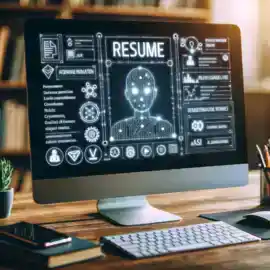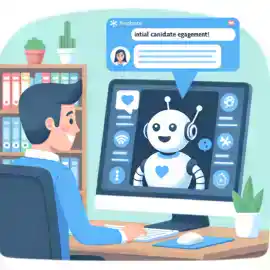Table of Contents
The landscape of Human Resources is undergoing a seismic shift, driven by the integration of Artificial Intelligence (AI) into Human resource practices. As organizations adapt to the fast-paced changes in the digital age, human resource is no exception. The intersection of HR and AI, often referred to as “Human Resources 2.0” or HR 2.0 promises to revolutionize the way companies recruit, manage, and retain talent.
This article explores the profound impact of AI on human resource processes and presents real-world examples of AI-powered tools that are reshaping the future of hiring.
The Evolution of HR: From Paper Resumes to Data-Driven Insights
Traditionally, HR was a paper-intensive department responsible for administrative tasks such as payroll and benefits management. Recruitment primarily involved manually reviewing resumes, conducting interviews, and making hiring decisions based on subjective judgment. However, with the integration of HR and AI, human resource has transformed into a data-driven, strategic function within organizations.

1. Resume Screening with AI
AI-driven resume screening tools have become indispensable for modern human resource departments. These tools use Natural Language Processing (NLP) and machine learning algorithms to scan and analyze resumes at a speed and scale impossible for humans. They can identify relevant qualifications, skills, and experience, allowing HR professionals to focus on candidates who best match the job requirements.
One such example is “FutureFitAI“, a recent innovation in the Human resource tech market. FutureFitAI uses advanced AI algorithms to aggregate and analyze data from various online sources, including social media profiles, blogs, and professional networks. Likewise, analyzing job posting data helps HR teams spot skill trends and hiring patterns for smarter recruitment decisions.
HR and AI: The Future of Recruitment
As organizations expand globally and face a competitive job market, finding the right talent has become more challenging than ever. AI has stepped in to streamline the recruitment process, making it faster, more efficient, and data-centric.
2. Chatbots for Initial Candidate Engagement
Imagine a scenario where a job seeker visits a company’s career page and has questions about a job posting or the application process. Traditionally, they might send an email or make a phone call and wait for a response.
“RecruitBot“ is at the forefront of AI-powered candidate engagement, offering real-time interactions with potential candidates. With advanced natural language processing capabilities, RecruitBot can address a wide range of queries, guiding candidates through the initial stages of the recruitment process.
Removing Bias from Hiring Decisions

One of the significant challenges in traditional hiring processes is bias, whether it’s conscious or unconscious. It has the potential to reduce bias in HR practices by making decisions based on data rather than personal judgments.
3. AI-Powered Video Interviews
Video interviews have become a standard part of the hiring process, especially for remote positions. AI tools can analyze these interviews to provide objective insights into a candidate’s qualifications, skills, and personality traits.
A recent introduction to this field is “FairViewAI”. This tool leverages robust Artificial Intelligence algorithms to scrutinize video interviews for potential biases in real-time. If the system identifies any bias in the interviewer’s questions or evaluations, it instantly alerts Human resource professionals, prompting them to revisit and adjust their assessments, championing a more equitable hiring process.
Enhancing Employee Experience and Retention
AI isn’t just transforming the front end of human resource by improving recruitment processes; it’s also playing a vital role in enhancing the employee experience and promoting employee retention.
4. Predictive Analytics for Employee Engagement
AI-driven predictive analytics tools can forecast when an employee might be at risk of leaving their job. By analyzing various data points, such as job satisfaction surveys, performance reviews, and even data from wearable devices, human resource can identify patterns and intervene proactively to improve employee engagement.
A notable innovation in this field is “EngageSense“. Beyond merely forecasting employee attrition, EngageSenseAI delivers concrete recommendations for HR strategies, enabling the retention of invaluable staff members.
Upskilling and Reskilling the Workforce
As the job market evolves with HR and AI innovations, the need for continuous learning and development has never been greater. AI-powered tools can assist human resource departments in identifying skill gaps and offering targeted training opportunities for employees.
5. AI-Driven Learning Platforms
In the realm of AI-driven learning platforms, “Coursera AI Academy” is making waves. Similarly, platforms like Coursiv are emerging to provide organizations with streamlined content creation and knowledge management solutions that support continuous workforce development. Coursera AI Academy leverages AI and machine learning to curate personalized learning paths for employees based on their existing skills and career aspirations. Coursera AI Academy leverages AI and machine learning to curate personalized learning paths for employees based on their existing skills and career aspirations. It also provides real-time feedback on progress, helping employees stay motivated and on track with their professional development.
The Challenges of Integrating HR and AI
In the HR and AI landscape, while AI offers immense promise for Human resource, its integration poses challenges. Organizations must tackle concerns related to data privacy, algorithmic bias, and employee acceptance. It’s vital to find a balance between the efficiency AI brings and the ethical considerations accompanying it.
Conclusion
Human Resources 2.0, powered by AI, represents a significant leap forward in the world of HR practices with deep integration of the processes of HR and AI. From automating mundane tasks to improving recruitment, reducing bias, and enhancing the overall employee experience, AI is reshaping every facet of HR.
The examples provided here demonstrate how AI-driven tools are making human resource processes more efficient, data-driven, and employee-centric.
As organizations continue to adapt to the digital age, those that embrace the potential of AI in HR will gain a competitive advantage in attracting, retaining, and developing top talent. However, it’s essential to approach the integration of AI with careful consideration of ethical and privacy concerns to ensure a future of HR that is not only technologically advanced but also fair and equitable for all.